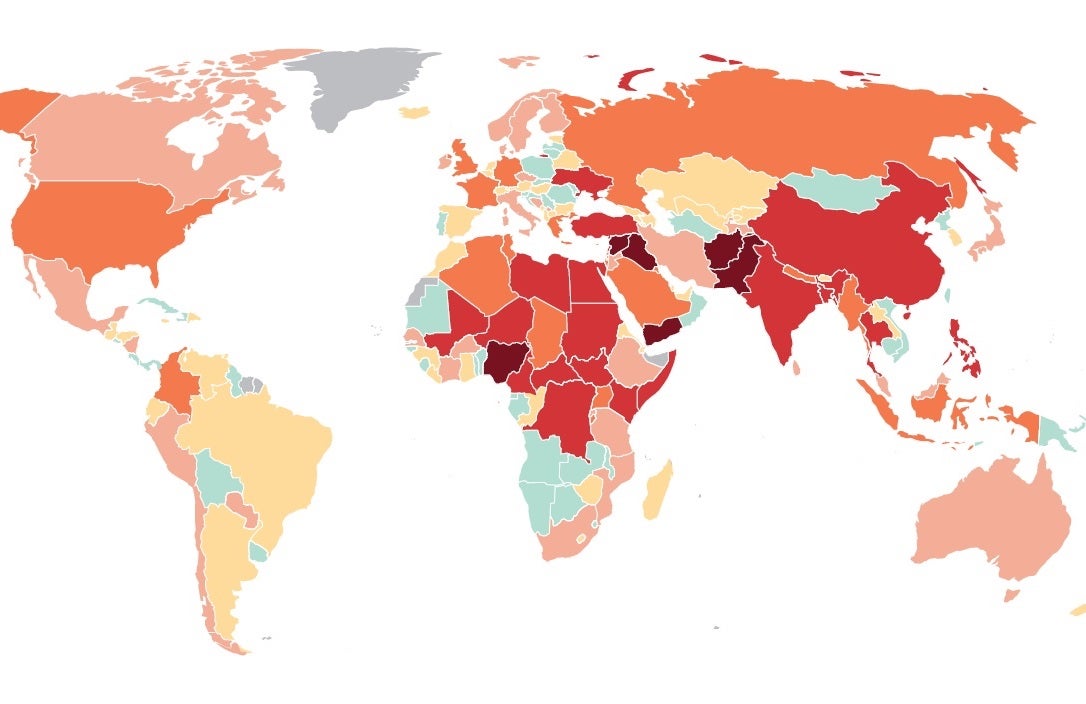Global Terrorism Index 2016: Developed countries suffer dramatic rise in terrorism-related deaths
As international terrorist groups are squeezed in their heartlands, the number of attacks in OECD countries has risen 650%

Your support helps us to tell the story
From reproductive rights to climate change to Big Tech, The Independent is on the ground when the story is developing. Whether it's investigating the financials of Elon Musk's pro-Trump PAC or producing our latest documentary, 'The A Word', which shines a light on the American women fighting for reproductive rights, we know how important it is to parse out the facts from the messaging.
At such a critical moment in US history, we need reporters on the ground. Your donation allows us to keep sending journalists to speak to both sides of the story.
The Independent is trusted by Americans across the entire political spectrum. And unlike many other quality news outlets, we choose not to lock Americans out of our reporting and analysis with paywalls. We believe quality journalism should be available to everyone, paid for by those who can afford it.
Your support makes all the difference.The world’s most developed countries have suffered a dramatic increase in deaths as a result of terrorism in the last year, according to the new Global Terrorism Index, despite a drop in the global number of terrorism-related deaths.
The index shows Isis is now officially the deadliest terrorist group in the world, overtaking Boko Haram, after claiming responsibility for 6,141 deaths through attacks in more than 250 different cities in 2015.
And the number of countries in which Isis has carried out attacks more than doubled, from 13 in 2014 to 28 in 2015.
Globally, the number of terrorism-related deaths dropped 10 per cent in 2015 from the year before, which had been a record in the 16 years covered by the index from the Institute of Economics and Peace.
The fall in deaths has been driven by military action against Isis and Boko Haram in Iraq and Nigeria respectively, but the index suggests those groups have expanded their influence in neighbouring countries and regions.
A 650 per cent increase in deaths from terrorism in OECD countries and a marked rise in transnational terrorist attacks means the world is now a yet-more dangerous place in terms of terrorism, according to the IEP.
Though the index identifies 274 distinct terrorist groups around the world, between them Isis, Boko Haram, al-Qaeda and the Taliban were responsible for 75 per cent of all terror-related deaths.
In terms of developed countries, 2015 was the second-deadliest year since records began. It was surpassed only by 2001, when the 9/11 attacks accounted for 2,996 deaths.
The index suggested there were lessons to be learned, such as the fact that only 0.5 per cent of terrorist attacks occurred in countries which have no involvement in foreign conflicts and low levels of “state-sponsored terror” - extra-judicial deaths, torture and imprisonment without trial.
The report found terrorism is also more likely to occur in OECD member countries with poorer performance on socio-economic factors such as opportunities for youth, belief in the electoral system, levels of criminality and access to weapons.
Despite receiving far greater international news coverage than any other terrorist incident of 2015, the Paris attacks with a combined death toll of 136 do not even feature in the top 10 most deadly events of the year.
The most fatal attack of 2015 was in April in Qaim, Iraq, when Isis fighters rounded up and executed 300 civilians.
Other incidents in the top 10 include the bombing of the Russian Metrojet passenger plane in October 2015, which killed all 224 people on board, and the April attack on Garissa University in Kenya when al-Shabaab militants executed at least 154 people, mainly non-Muslim students.
Steve Killelea, Executive Chairman of IEP, said, “This year’s GTI report highlights the most complex set of dynamics in global terrorism in the last 16 years.
“While on the one hand the reduction in deaths is positive, the continued intensification of terrorism in some countries and its spread to new ones is a cause for serious concern and underscores the fluid nature of modern terrorist activity.
“The attacks in the heartland of western democracies underscore the need for fast paced and tailored responses to the evolution of these organisations.”
Join our commenting forum
Join thought-provoking conversations, follow other Independent readers and see their replies
0Comments